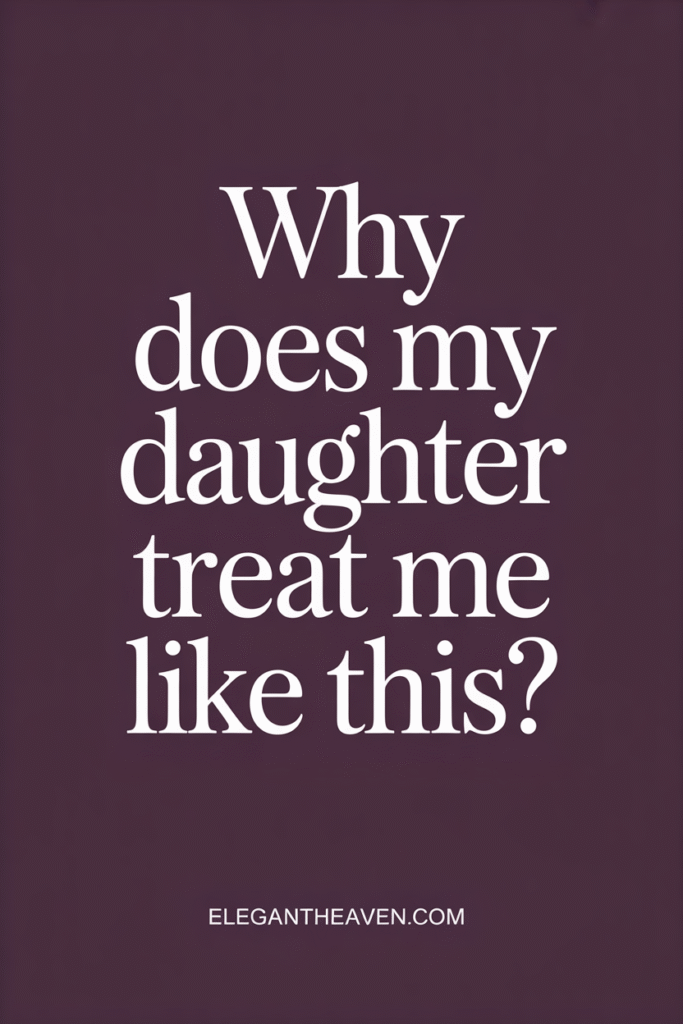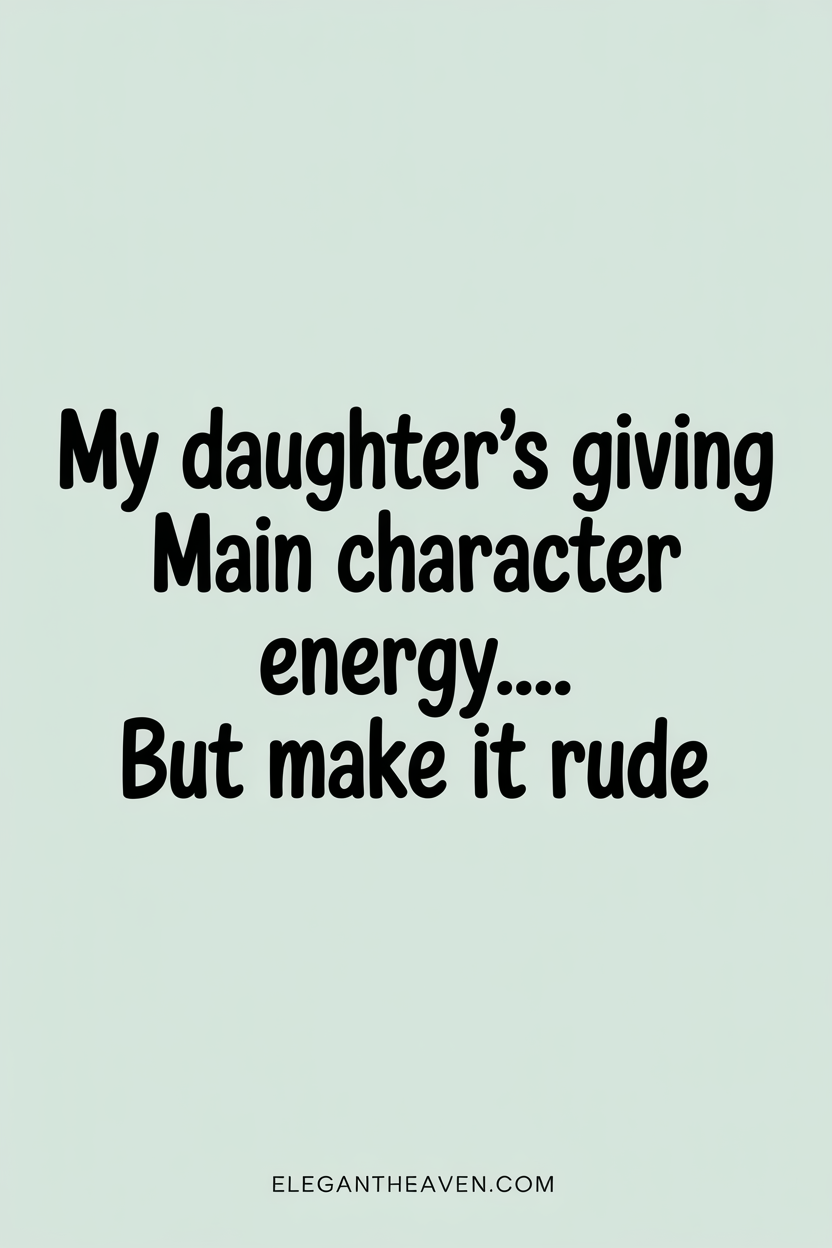Parenting can be one of life’s most rewarding experiences — and one of the most challenging. When your daughter constantly talks back, shows attitude, or seems disrespectful, it can be hurtful and confusing. You might ask yourself over and over, “Why is my daughter always rude to me?” If this feels familiar, you’re not alone.
This article explores the most common reasons behind a daughter’s rude behavior, how to identify the root causes, and most importantly, how to respond in a healthy and constructive way.
Common Reasons Why Your Daughter May Be Rude to You

Here are the most likely explanations — each with a brief, parent-friendly description:
1. She’s Going Through Hormonal Changes (Especially in Puberty)
Why it happens: As girls enter puberty, hormone fluctuations (especially estrogen) can lead to mood swings, irritability, and impulsiveness.
What it looks like: Snapping, eye-rolling, anger over small things.
What you can do: Stay calm, give space when needed, and remind yourself that these changes are biological — not personal.
2. She’s Testing Boundaries
Why it happens: As part of growing up, children naturally push limits to assert independence.
What it looks like: Defiance, talking back, challenging your authority.
What you can do: Be consistent with rules, stay firm but fair, and don’t let power struggles escalate.
3. Unresolved Emotional Issues
Why it happens: Children may act out when they’re struggling with emotions they don’t know how to express — like sadness, anxiety, or trauma.
What it looks like: Aggression, stonewalling, or sarcastic responses.
What you can do: Create safe spaces for emotional conversations, ask open-ended questions, and consider therapy if needed.
4. You May Be a Safe Target
Why it happens: Children often feel safest expressing negative emotions with the people they trust most — usually, their parents.
What it looks like: She’s polite to others but rude to you.
What you can do: Understand that this is actually a sign of trust, but don’t allow disrespect. Set limits and teach respectful expression.
5. She Feels Criticized or Not Heard
Why it happens: If your daughter feels you’re always correcting, judging, or lecturing her, she may become defensive or rude.
What it looks like: “You never listen!” or “You don’t understand me!”
What you can do: Focus on active listening, validate her emotions, and avoid overreacting.
6. Peer Influence and Social Pressure
Why it happens: Friends, school environments, or online platforms may model rude or disrespectful behavior.
What it looks like: New phrases, slang, or body language that mimics peers.
What you can do: Monitor media and friendships gently. Talk about respectful communication at home.
7. She’s Seeking Attention
Why it happens: Sometimes, even negative attention is better than feeling invisible.
What it looks like: Interrupting, provoking arguments, or making sarcastic remarks.
What you can do: Spend one-on-one time, offer positive reinforcement, and catch her being good.
8. Mental Health Concerns
Why it happens: Conditions like anxiety, depression, or ADHD can cause irritability, low frustration tolerance, and rude behavior.
What it looks like: Moodiness, withdrawal, outbursts, or extreme sensitivity.
What you can do: Consult a mental health professional if behavior is extreme or persistent.
9. Lack of Clear Boundaries at Home
Why it happens: When children aren’t taught limits early, they may not understand what behavior is appropriate.
What it looks like: Talking to you like a peer, ignoring rules, or sarcasm.
What you can do: Set age-appropriate boundaries, enforce consequences consistently, and model respectful communication.
10. Mirroring What She Sees
Why it happens: Kids often imitate what they observe — whether it’s sarcasm, yelling, or passive aggression.
What it looks like: Repeating language or tone she hears from parents, siblings, or TV.
What you can do: Reflect on your own communication patterns. Model the behavior you want to see.
How to Respond to Your Daughter’s Rudeness
- Stay Calm: Responding emotionally can escalate the situation.
- Set Clear Expectations: Let her know what respectful communication looks like.
- Pick Your Battles: Not every comment needs a confrontation.
- Give Her Autonomy: Empower her in areas she can control to reduce the need for rebellion.
- Have Private Conversations: Correct behavior in private, not in front of others.
- Model Respect: Speak to her the way you want her to speak to you.
- Use “I” Statements: Example: “I feel disrespected when you roll your eyes at me.”
- Seek Counseling Together: Family therapy can help improve communication.
FAQs About Rude Behavior in Daughters
Q: Is rudeness a normal part of growing up?
A: Yes, to some extent. Especially during adolescence, it’s common for children to test boundaries and express themselves with attitude. The key is how you respond.
Q: When should I be concerned about my daughter’s behavior?
A: If the rudeness escalates into verbal abuse, self-harm, or withdrawal, or if it affects her school and social life, it’s time to seek professional help.
Q: What if I’ve tried everything and nothing works?
A: You’re not alone. Parenting can be overwhelming. Don’t hesitate to seek a family therapist, school counselor, or support group to help you and your daughter communicate more effectively.
Q: Could my behavior be influencing hers?
A: Absolutely. Children mirror adult behavior. If yelling, sarcasm, or criticism are common in the home, she may be responding in kind.

Final Thoughts: It’s Not About You — It’s About Connection
It’s easy to take your daughter’s rudeness personally. But in many cases, it’s not a rejection of you — it’s a signal of growing pains, unmet emotional needs, or difficulty expressing herself. The goal isn’t just to stop the behavior, but to understand it and connect.
By staying calm, being consistent, and showing unconditional love (with boundaries), you can help guide your daughter into a respectful and emotionally healthy adult.








